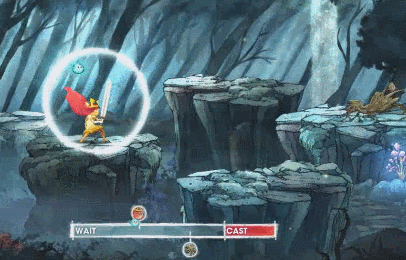Child of Light's fairytale narrative is diluted, significantly, by its insistence on rhyming dialog. The writing is routinely stretched and twisted just for the sake of a barely-rhyming word, sucking the personality out of any given character's lines.
(With the exception of the jester, Rubella, who adorably flubs the system by using a rhyming word's non-rhyming synonym instead.)
The game's story feels weak overall, as Aurora's goal is never terribly clear. That is to say: She's trying to get out of this dream world, but how? Something about a song? And a mirror? All I'm really doing is exploring my way through the map, and continually getting distracted by side-characters.
The gameplay, though, is uniquely fascinating and compelling. Both in the sidescroller-style overworld - which has enough light puzzle-solving, obstacle-avoidance, and maze-finding to add some substance to its aesthetic beauty - and in the real-time combat.
Probably the most defining characteristic of its battle system is the timeline, and how it can lead to interruptions. Each character has a speed stat, which defines how quickly it progresses through the "wait" part of the battle timeline; and each action you select has a speed, which is how long it spends in the "cast" part of the timeline. While a character is in the "cast" part, it can be interrupted by an enemy attack.

So while you're trying to time your attacks to interrupt foes, you're simultaneously trying to avoid being interrupted yourself -- using Defend to defer your action until later, or choosing a high-speed action to beat your enemies to the punch. The timeline pauses when you're making selections, giving you plenty of time to think your tactics over.
Combat also incorporates some real-time interactivity, via the whisp, Igniculus. He's moved with the right analog stick, and using his power will either slow down a specific enemy, or gradually heal a party member. The slowing, in particular, is pretty vital in working the timeline to your advantage.
There are plenty of other quirks to Child of Light's battles, like character-specific talent trees and the element-infused Oculi gems, but most of these components are never so prevalent that they make the game feel overly complex. For an RPG, it's relatively easy to wrap your head around.
It's worth noting that I'm playing on Expert difficulty (as opposed to the default, Casual setting), which I wouldn't say feels "expert" so much as it does "moderately challenging." There are some enemies who really frustrate me, but having fought through maybe half of the game so far, I've only had to use inventory items a handful of times.
Child of Light's storytelling is disappointingly thin; but the core gameplay is solid. More than seeing the plot through, I'm really looking forward to leveling up my party.
Progress: Chapter 6
